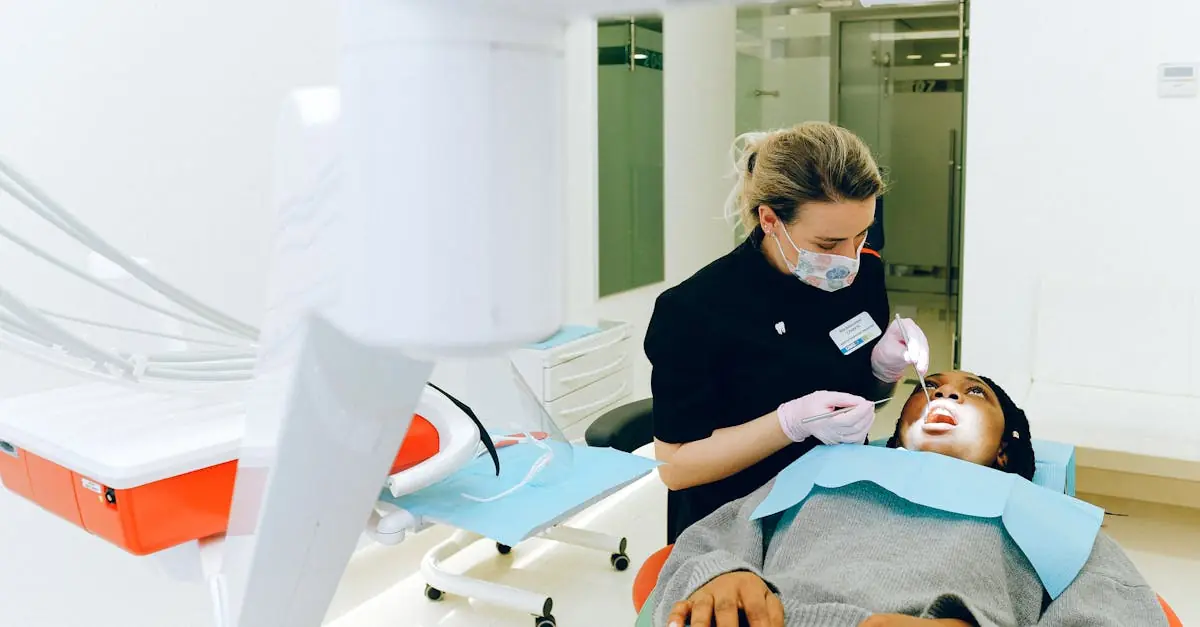When it comes to maintaining a healthy smile, preventive dental care plays a crucial role. I’ve learned that this proactive approach isn’t just about treating problems as they arise; it’s about stopping them before they even start. By focusing on regular check-ups and good oral hygiene practices, I can catch potential issues early and keep my teeth and gums in top shape.
Preventive dental care encompasses a variety of practices, from routine cleanings to patient education on proper brushing and flossing techniques. Understanding what qualifies as preventive care helps me make informed decisions about my dental health. In this article, I’ll explore the key components of preventive dental care and why it’s essential for everyone, regardless of age or dental history.
Table of Contents
ToggleKey Takeaways
- Preventive dental care focuses on maintaining oral health by addressing issues before they arise, emphasizing regular check-ups and proper at-home hygiene practices.
- Key components of preventive care include regular check-ups, professional cleanings, fluoride treatments, and dental sealants, all essential for effective oral care.
- Regular check-ups allow for early detection of dental problems, ensuring timely interventions that can prevent complications and costly treatments in the future.
- At-home practices like proper brushing and daily flossing are crucial for reducing the risk of cavities and gum disease, supporting overall dental health.
- Investing in preventive care offers significant financial savings, with every dollar spent potentially saving $8 to $50 in future dental treatments, reinforcing the importance of routine care.
- A balanced diet and hydration play a vital role in oral health, helping to minimize tooth decay and support effective preventive measures.
Understanding Preventive Dental Care
Preventive dental care encompasses a range of practices aimed at maintaining oral health and preventing dental issues. Regular dental check-ups play a crucial role, allowing professionals to monitor my dental health and catch potential problems early. During these visits, dentists perform examinations, cleanings, and diagnostic tests to assess oral conditions.
Routine cleanings involve the removal of plaque and tartar, which helps reduce the risk of cavities and gum disease. Dentists or hygienists also provide personalized guidance on oral hygiene techniques, covering effective brushing and flossing methods that promote better home care.
Fluoride treatments are another essential component. These treatments strengthen tooth enamel and protect against decay, especially for those at higher risk of cavities. Additionally, dental sealants can be applied to the chewing surfaces of molars, providing an extra layer of protection against food particles and bacteria.
Overall, preventive dental care emphasizes proactive measures to maintain oral health. It encourages me to adopt good practices that not only enhance my smile but also reduce the likelihood of future dental issues. By prioritizing preventive care, I invest in long-term oral health and ensure vibrant smiles for years to come.
Importance of Preventive Dental Care
Preventive dental care plays a crucial role in maintaining oral health and preventing problems before they start. By prioritizing these practices, individuals can enjoy numerous health and financial benefits.
Health Benefits
Health benefits from preventive dental care include the reduction of dental issues such as cavities and gum disease. Regular check-ups allow dentists to detect early signs of problems, leading to timely interventions. Routine cleanings remove plaque and tartar buildup, lowering the risk of decay and promoting overall oral hygiene. Preventive measures also guide effective brushing and flossing techniques, which contribute to fresher breath and healthier gums.
Additionally, fluoride treatments enhance enamel strength, providing extra protection against decay. Dental sealants offer a protective barrier on chewing surfaces, significantly decreasing the likelihood of cavities. Maintaining oral health positively impacts overall wellness, as poor dental health correlates with various systemic conditions, including heart disease and diabetes.
Financial Benefits
Financially, preventive dental care saves money in the long run. Regular visits can prevent the need for costly treatments, such as root canals or tooth extractions. Early detection of dental issues often leads to less complex and less expensive interventions compared to waiting for problems to worsen. According to the American Dental Association, every dollar spent on preventive care can save $8 to $50 in future treatment costs.
Moreover, many dental insurance plans cover routine preventive care services, reducing out-of-pocket expenses for check-ups and cleanings. By investing in preventive measures today, individuals secure better financial outcomes and maintain a healthy smile for years to come.
Key Components of Preventive Dental Care
Preventive dental care includes various essential practices that help maintain oral health and prevent potential issues. Understanding these components can significantly contribute to achieving and maintaining a healthy smile.
Regular Check-ups
Regular check-ups are fundamental in preventive dental care. These appointments allow dental professionals to assess oral health, monitor changes, and identify potential issues early. Typically, I schedule check-ups every six months. During these visits, dentists perform thorough examinations, including X-rays if necessary, to detect problems before they escalate.
Professional Cleanings
Professional cleanings play a crucial role in maintaining oral health. Dental hygienists perform these cleanings to remove plaque and tartar buildup that regular brushing may miss. I find that these cleanings not only refresh my smile but also reduce the risk of cavities and gum disease. Typically, I undergo professional cleanings at my biannual check-ups, ensuring my teeth remain healthy and strong.
Dental Sealants
Dental sealants offer an additional layer of protection against decay, particularly on hard-to-reach molars. These thin coatings are applied to the chewing surfaces of teeth, effectively sealing out food particles and bacteria. I consider sealants especially beneficial for children and teenagers, as their teeth are more susceptible to cavities during their formative years. Sealants can last several years with proper care, providing ongoing protection.
Fluoride Treatments
Fluoride treatments strengthen tooth enamel and help prevent cavities. Dental professionals apply a concentrated fluoride solution during check-ups or cleanings, promoting further protection against decay. I appreciate the benefits of fluoride, especially in areas where drinking water lacks sufficient fluoride levels. Regular fluoride treatments can significantly reduce the risk of dental issues, especially for children, teens, and individuals with a history of cavities.
At-Home Preventive Dental Care
At-home preventive dental care plays a crucial role in maintaining oral health. It involves consistent practices that I can implement daily to reduce the risk of dental issues.
Proper Brushing Techniques
Proper brushing techniques are vital for effective oral hygiene. I use a soft-bristled toothbrush and fluoridated toothpaste. I brush twice a day, spending at least two minutes each time. I hold the toothbrush at a 45-degree angle to my gums, using gentle, circular motions. I ensure I reach all tooth surfaces, including the outer, inner, and chewing areas. I replace my toothbrush every three to four months or when the bristles fray.
Flossing Importance
Flossing plays an essential role in my oral care routine. Daily flossing removes plaque and food particles between teeth that my toothbrush can’t reach. I use about 18 inches of dental floss, winding it around my middle fingers and using my thumbs and index fingers to guide it. I gently slide the floss between my teeth, curving it around each tooth in a C shape. Regular flossing helps prevent gum disease and cavities.
Dietary Considerations
Dietary considerations significantly influence my dental health. I limit sugary snacks and beverages, as they contribute to tooth decay. I include a variety of fruits, vegetables, whole grains, lean proteins, and dairy products in my diet. Foods rich in calcium, such as cheese and yogurt, help strengthen my teeth. Staying hydrated with water helps wash away food particles and bacteria, supporting my overall oral hygiene.
Preventive dental care is essential for anyone looking to maintain a healthy smile and avoid costly treatments down the line. By prioritizing regular check-ups and good oral hygiene practices, I can catch potential issues early and keep my teeth and gums in top shape. Incorporating fluoride treatments and dental sealants into my routine provides an extra layer of protection against decay.
Adopting effective at-home practices like proper brushing and daily flossing not only supports my oral health but also contributes to my overall well-being. Ultimately, investing time in preventive care is a smart choice that pays off in both health and financial savings.



